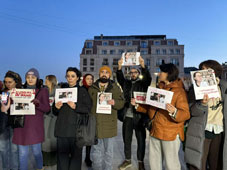
Media Organizations Condemn Arrest of Mzia Amaglobeli, Call for Accountability
By Liza Mchedlidze
Monday, January 13, 2025
Organizations defending independent media and professional rights have condemned the arrest of Batumelebi and Netgazeti founder Mzia Amaglobeli, describing her detention as a "pre-planned criminal provocation" by Georgian authorities. Their statement, released on January 12, criticizes the government for its alleged targeting of independent media and escalating repression against dissenting voices.
The statement asserts that Amaglobeli's arrest is part of a broader effort to intimidate critical media. It highlights two incidents from January 11, when Amaglobeli was detained twice. The first arrest occurred while she was placing a sticker on the fence of the Adjara Police Department advocating for a nationwide strike planned for January 15. Witnesses report that police failed to inform her of the reason for her detention.
The second arrest took place during a protest outside the police department, where Amaglobeli joined demonstrators calling for the release of detained activists. Eyewitnesses allege that Batumi Police Chief Irakli Dgebuadze verbally abused Amaglobeli before detaining her under what the statement describes as dubious circumstances. The organizations note that Dgebuadze has previously been accused of aggression toward journalists, including threatening Batumelebi editor Eter Turadze in December.
Amaglobeli is currently charged under Article 353 of the Criminal Code for allegedly assaulting a police officer, a crime punishable by 4 to 7 years in prison. However, her defenders argue that the circumstances surrounding her detention suggest a deliberate effort to silence her and intimidate other independent journalists.
The organizations behind the statement have raised concerns over video footage of the arrest, distributed by pro-government media outlets, which they claim is heavily edited. The footage allegedly omits critical parts of the events leading up to the arrest and fails to provide a full account of the interaction between Amaglobeli and the police. This selective representation, the statement suggests, is intended to discredit Amaglobeli and justify her detention.
The statement highlights serious procedural violations and instances of mistreatment during Amaglobeli's detention. Despite multiple requests, her lawyers were denied access to her for more than three hours, which the organizations argue is a violation of her constitutional right to legal representation. Additionally, Amaglobeli reportedly endured improper treatment in custody, which the statement describes as part of an effort to punish and intimidate critical voices in the media.
The arrest of Amaglobeli is seen as part of a broader pattern of escalating repression in Georgia. The organizations behind the statement emphasize that women, minors, disabled persons, and journalists have increasingly become targets of police actions. They further note that the targeting of Amaglobeli, a prominent media figure who has been at the forefront of independent journalism in Georgia since the 1990s, is a particularly alarming development.
The statement also situated Amaglobeli's detention within the context of the Georgian government's alleged shift toward authoritarian practices. The use of police force against media figures, combined with procedural violations, is cited as evidence of a deliberate effort to stifle dissent and suppress critical reporting.
In their statement, the organizations issue a series of demands aimed at addressing what they see as a growing crisis for media freedom in Georgia:
- Immediate release of Mzia Amaglobeli by the Ministry of Internal Affairs.
- A thorough investigation into allegations of mistreatment and procedural violations, to be conducted by the Special Investigation Service.
- Suspension of Batumi Police Chief Irakli Dgebuadze to ensure impartiality during the investigation.
- Increased international attention, urging diplomatic corps and international organizations to monitor the case and advocate for press freedom in Georgia.
Media organizations warned about the consequences of continued repression against independent media and civil society. They argue that the Georgian government's actions undermine democratic principles, erode public trust, and damage the country's international reputation. By targeting prominent journalists like Amaglobeli, the government risks alienating its citizens and further deepening the political crisis.
The organizations urge swift and decisive action to ensure accountability and protect the fundamental rights of journalists and activists, emphasizing the critical role of independent media in a functioning democracy.

